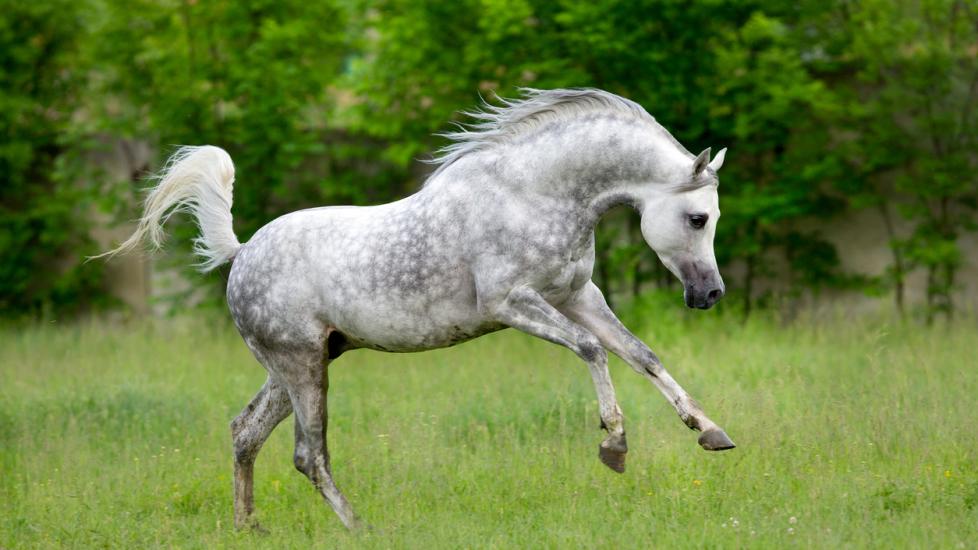Myofibrillar Myopathy in Horses
What Is Myofibrillar Myopathy in Horses?
Myofibrillar Myopathy or (MFM) is the disorder of a protein called desmin in the muscle cells of horses. The defect in this protein affects the structure and the functionality of muscle fibers and prevents them from contracting completely. Affected horses will experience lameness and may show an unwillingness to move.
Arabians and Warmbloods are more prone to this disorder. MFM generally first presents when a horse is between 6 and 8 years old, as this is when many horses begin more serious training.
Symptoms of Myofibrillar Myopathy in Horses
-
Shifting or hind limb lameness
-
Exercise intolerance or a decline in performance
-
Stiffness
-
Muscle pain
-
Tying up (rarer)
The symptoms of MFM can be very similar to many other causes of lameness in horses such as tendon and ligament injuries, poor saddle fit, arthritis, and OCD (developmental condition of the joint). These symptoms are also similar to other muscle disorders such as polysaccharide storage myopathy (PSSM) and exertional rhabdomyolysis.
Causes of Myofibrillar Myopathy in Horse
MFM is believed to be a genetic condition that is most common in Arabian and Warmblood horses. Researchers believe there is a genetic issue responsible for coding of a protein involved in muscle fiber contraction.
How Veterinarians Diagnose Myofibrillar Myopathy in Horses
Every diagnosis of MFM starts with a thorough physical, lameness, and neurologic exam by a veterinarian. Once some of the more common causes of lameness have been ruled out (soft tissue injuries, etc.) the veterinarian may recommend a muscle biopsy.
A muscle biopsy is the only definitive way to diagnose MFM. The biopsy is sent to a pathologist who uses a special type of stain to identify the abnormal desmin proteins that are characteristic of MFM.
Recovery and Management of Myofibrillar Myopathy in Horses
There is no cure for MFM so all treatments revolve around managing the symptoms and supporting the horse’s muscle health and function.
-
Diet: Recent research has shown that a balanced diet with sufficient sources of protein, fats, and non-structural carbohydrates is required for horses with MFM to thrive. This means having a forage analysis performed, choosing an appropriate grain, and using supplements to fill in the differences.
-
Exercise: Horses with MFM need longer and more thorough warm-up and cool-down periods than other horses. This should involve lots of long and low stretching and very little engagement and working in a frame. It was once believed that these horses needed to be exercised every single day to minimize their symptoms. More recent research has shown that these horses require a balance of consistent exercise and rest days to allow for muscle building and recovery. Good turnout is also important.
-
Supplements: Research has started to show some benefits of supplementing amino acids in the form of CoQ10 as well as antioxidants.
Prevention of Myofibrillar Myopathy in Horses
Since there is likely a genetic component to MFM, it is not completely preventable. However, diet, exercise, and supplement management can help to prevent episodes of excessive muscle soreness and exercise intolerance that are common to the disease.
References
Myofibrillar Myopathy. The College of Veterinary Medicine at Michigan State University.
Valberg, S J et al. Clinical and histopathological features of myofibrillar myopathy in Warmblood horses. Equine veterinary journal vol. 49,6 (2017): 739-745. doi:10.1111/evj.12702
Valberg, S J Diagnosis and Management of Myofibrillar Myopathy in Warmblood Performance Horses. AAEP Proceedings, vol. 67, 2021, pp. 214–218.
Featured Image: iStock.com/Alexia Khruscheva
